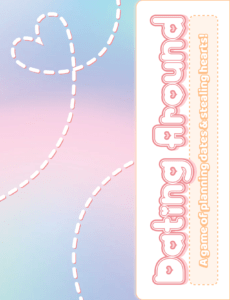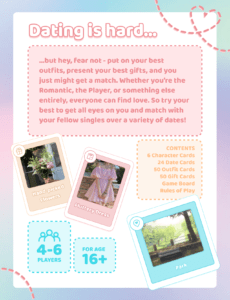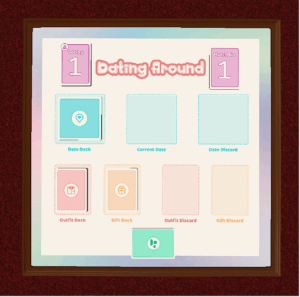Dating Around
By Miranda Diaz, Ember Fu, and Jasmine Steele
Dating Around is a lively social game with a romantic spin, where you play to win the hearts of your fellow singles while searching for love yourself. We wanted to give players a lighthearted dip into the dating experience—putting together cute, funny, or surprisingly synergistic combinations, floundering at appealing to a crowd, and pondering who to try matching with. With a variety of date locations to set the scene, Dating Around should naturally give rise to interesting and wacky stories while everyone gets to judge and be judged together! If one’s feeling up to it, there’s room for players to strategize their dating approach based on the character personality trope they receive. Still, the true heart of the game lies in sitting back, building a fun narrative arc with friends, and expressing yourself within Dating Around’s romantic bubble.


Initial Ideation
Our initial ideas revolved around the idea of incorporating the fun of dating sims into a card game. Specifically, the key experiences we wanted to convey were expressing oneself, winning social favor, and creating a narrative. We also valued having lots of opportunity for interaction among players, which also meant the narrative of the game should be built collectively.
With this in mind, we started with a game concept that would have each player choose a character to pursue romantically. We quickly shifted away from this idea as the experience would be too separate across individual players—it would be too difficult to connect a bunch of different paths into a collective experience, especially for a larger number of players. So, we decided to have players play as particular characters instead, with a common romantic interest. This would better promote interaction and competition amongst players. We also wanted to explore the idea of having one player actually play as the romantic interest, shaping the concept to have elements of a social judgment game.
“Oh! What if the players are all trying to impress one player together, like it’s The Bachelor?”
Altogether, this gave rise to the first version of Dating Around. Formally, it would be a 4-8 player game, where all but one player participate in a multilateral competition. These we temporarily dubbed “suitors” and the “bachelor”. The bachelor would act as a judge and potentially have other abilities that would influence the game, but would not be in competition, making their experience more akin to single-player versus game. In hindsight, this disconnect between game experiences made fashioning the roles and gameplay a bit awkward, but we still wanted to playtest the idea first.
The game would then involve players taking turns and having a judgment round between turn cycles. This judgment round would consist of presenting a date location prompt, suitors presenting date cards such as outfits or gifts, and the bachelor choosing one such presented date bundle. The chosen suitor gains “favor points”, and after a set number of cycles, the final judgment round, where points are worth double, takes place. The game then ends, determining the winner by calculating each player’s total number of points. Thus, the objective for suitors would ultimately be to have the most points at the end of the game, in a zero-sum game—individual outcomes would be winning as the best suitor, and losing otherwise.
And finally, conflict in the game comes from players competing for points, gained by winning the judgment rounds and from interactions that they could take on their own turns. Other actions like sabotaging other players could also be taken on their turns, which brings us to the idea of “stats”. In our initial design for Dating Around, we had the additional layer of giving the playable characters four stats, flavored as: Intelligence, Charisma, Boldness, and Appeal. The idea was to use these stats as resources players should try to gain or lower for other players, and their primary use would be to determine if players succeed in “interacting” with the bachelor—mechanically, a stat check.
Hence, the first version of our game was meant to foster strategic player rounds followed by a social judgment round, with maintained competition throughout in gaining stats and being chosen by the bachelor. We wanted players to have fun by enjoying the narrative following from interactions and dates, and from expressing themselves through the character they play and the date bundles they present. At the same time, at this stage of the design, we also wanted players to enjoy the strategic challenge of playing cards to gain stats and sabotage others.
Testing and Iteration
We conducted four playtests of Dating Around, and each one led to significant changes to the game. Below, we will consolidate background information on our playtesters, specific successes, areas for improvement, and the refinements that we made in response to feedback.
In our first playtest, we wanted to answer three questions. How does fun compare between the player that is the bachelor and the other players who are suitors? Does the current mix of numerical stat-building and social judging mechanics work? How does the use of preset character cards influence play? The playtest took place in class with a group of four students: three girls and one boy. Three of the playtesters appeared to be close friends. Focusing on what went well, it was very clear that all of the players deeply enjoyed our gift and outfit cards. They were laughing as they drew them from the deck, and they leaned in to see the cards when others played them. Additionally, the players were able to quickly pick up on the rules and mostly self-moderated from the third round on. The date cards were effective in guiding the players choices, whether that be the bachelor choosing someone to date or the suitors choosing what card combinations to play. When speaking, all players referenced the current date card and how the gift/outfit card combinations related to it. Focusing on areas of improvement, players told us that the stat system was confusing and hard to keep track of.
“I didn’t feel a strong motivation to raise my stats because it would be more effective to focus on winning dates instead.”
The most significant issue in our first playtest was having one player be the bachelor. The playtester who was the bachelor looked incredibly bored and sad while they had to sit and wait for the suitors to finish their rounds. Our TA had advised us that giving the bachelor more power or control over the direction of the game might help balance the fun between bachelor (minority) and suitors (majority). However, this advice was not reflected in our first playtest because we were worried that giving the bachelor more control would increase social fun at the cost of the strategic objective. This choice resulted in the bachelor having very little fun, so we knew something needed to be changed. In response to the feedback, we decided to make the bachelor a rotating role. Rather than a single player being the bachelor for the entire game, the role would move around the table clockwise with one player being bachelor per round. We made this change because we felt it would help keep all of the players more equally involved in the game.
In our second playtest, we were focused on seeing how the rotating bachelor role impacted the fun of our playtesters. We wanted to keep the other mechanics the same, so we could compare the results of the second playtest more directly to the results of the first playtest. This playtest took place in class with a group of four students: three girls and one boy. Three of the playtesters appeared to be close friends. It is important to note that, due to time constraints in class, our playtesters were only able to get through one round of a game. We noticed that these players also really enjoyed the designs of the gift and outfit cards. Moreover, the rotating bachelor role resulted in no single player being left out; all players looked engaged throughout their time playing. Nevertheless, there was something that one player said that struck us.
“What is the point of raising intelligence versus charisma? What is the difference?”
We couldn’t come up with a clear answer for this which made us realize that our stats system wasn’t adding the strategic aspect that we had hoped for. It served as an additional layer of randomness that made our playtesters confused and frustrated.
Despite this playtest being very short, we were inspired to make a significant overhaul to Dating Around. The goal of the overhaul was to focus on the social judging aspect of the game (which all players had enjoyed) and remove the stat-building mechanic. We started by removing the interaction cards, action cards, and vibe system. We add more item and outfit cards, separating these card types into separate decks. Most importantly, we changed how players gain points throughout the game. Previously, players would try to earn points by wooing the heart of a single bachelor acting as judge.
In our new iteration, we would have all players choose another player to match with, and they would win points if they successfully matched with another player. All players act as judges, and there can be multiple successful matches per round. To accommodate this new objective, we created a deck of voting cards that allow players to show who they want to match with each round. Lastly, we removed the initial stats that were associated with each of the playable characters and gave them unique objectives instead. We made these changes because we acknowledged that our stat system was not fun for playtesters and did not encourage the type of fun that we had originally predicted it to.
In our third playtest, we wanted to test the effectiveness of Dating Around’s new direction via these three questions. Does focusing on the social judging aspects fix the confusion and frustration that players had around the stat-building mechanics? How balanced are the unique character objectives? Is five rounds of play too long, just right, or too short? This playtest took place in class with five students: 4 girls and 1 boy. They were all friends. As with the previous playtests, we saw that the players enjoyed the gift and outfit cards, using phrases such as “sheeeeeeesh” and “these are a vibe”. Similarly, they picked up the rules very quickly and didn’t need much guidance. They also relied on the date cards to guide their judgment of outfit/gift combinations. A new positive finding was that this group was particularly focused on curating their outfit/gift combinations which was likely the result of placing a heavier emphasis on the social judging aspect of Dating Around.
Reflecting on areas of improvement, we found that there was a conflict between trying to accomplish your character’s unique objective and trying to date the person whose combination you genuinely liked the most. Additionally, players said that it was very difficult to get points because they couldn’t predict how others would vote. Together, these factors made them feel like the game was very difficult to win. In response to these concerns, we rebalanced characters by removing character objectives and adding character bonuses that were low stakes and would not influence how a player chooses who to date. We also added a rule that allows players to earn 1 additional point for each person that wants to date them each round, as opposed to solely earning points from successful matches. We made these changes to encourage a more even distribution of points across players and give players the freedom to have fun via self expression without having to go against their character’s abilities.
Another point of feedback from players was to color code the different decks of cards to make the difference more clear. We agreed that this would lessen the mental burden on our players, so we color coded the cards and marked them with unique symbols to denote their card type. Lastly, we added a game board that helps organize the different decks and reminds players where to draw cards from and where to discard cards.

Our fourth and final playtest was our most successful. The playtest was held on Tabletop Simulator with players communicating via a Discord voice channel. There were four players: two girls and two boys. They were all close friends. In terms of successes, we observed that the playtesters enjoyed the design of the cards, were very invested in the narrative-building aspect of the game, focused on picking a strong combination of cards, had more successful dates than the previous playtest, engaged in open commentary about each other’s combinations, and even added their own twists to the procedures of the game. For example, they would shake their voting cards with their hand if they were ready to reveal, and they would do a group countdown before revealing their votes. It seemed to be a lot of fun for them, despite these steps not being explicitly written in the rules. Additionally, one player told us that Dating Around reminded them of Monster Seeking Monster and Red Flags which we did take inspiration from.
“You guys took all the fun parts of those games and combined them in a way that works.”
The only hiccup that we encountered in this playtest was that the players were unsure of when to reveal their character cards. We decided to add revealing your character card as an explicit step in the rule book to avoid this being a problem for future players.
The Final Version
With Dating Around, we were ultimately able to create a positively received party game that captured the feeling of lighthearted, social fun wrapped in a cute romantic narrative. We were happy to incorporate the many changes we needed from feedback to make the game as solid as it should be, and the results of our fourth playtest were especially promising, which you can watch for yourself here. And if this looks like a game you’re interested in, you can try Dating Around yourself via the Print-and-Play version here or even online with friends in Tabletop Simulator! You can find the Steam page for that here.
Thanks for following our journey of creating Dating Around!


